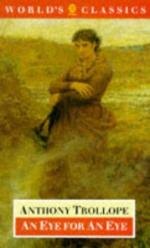have been so altered in favour of the Roman Catholics,
and against the Protestants, that a priest can do
almost just what he likes. I do not think that
he would scruple for an instant to marry them if he
thought it likely that his prey would escape from
him. My own opinion is that there has been no
marriage as yet, though I know that others think that
there has been.” The expression of this
opinion from “others” which had reached
Lady Mary’s ears consisted of an assurance from
her own Protestant lady’s maid that that wicked,
guzzling old Father Marty would marry the young couple
as soon as look at them, and very likely had done
so already. “I cannot say,” continued
Lady Mary, “that I actually know anything against
the character of Miss O’Hara. Of the mother
we have very strange stories here. They live in
a little cottage with one maid-servant, almost upon
the cliffs, and nobody knows anything about them except
the priest. If he should be seduced into a marriage,
nothing could be more unfortunate.” Lady
Mary probably intended to insinuate that were young
Neville prudently to get out of the adventure, simply
leaving the girl behind him blasted, ruined, and destroyed,
the matter no doubt would be bad; but in that case
the great misfortune would have been avoided.
She could not quite say this in plain words; but she
felt, no doubt, that Lady Scroope would understand
her. Then Lady Mary went on to assure her friend
that though she and her father and sisters very greatly
regretted that Mr. Neville had not again given them
the pleasure of seeing him at Castle Quin, no feeling
of injury on that score had induced her to write so
strongly as she had done. She had been prompted
to do so simply by her desire to prevent
a most
ruinous alliance.
Lady Scroope acknowledged entirely the truth of these
last words. Such an alliance would be most ruinous!
But what could she do? Were she to write to Fred
and tell him all that she heard,—throwing
to the winds Lady Mary’s stupid injunctions
respecting secrecy, as she would not have scrupled
to do could she have thus obtained her object,—might
it not be quite possible that she would precipitate
the calamity which she desired so eagerly to avoid?
Neither had she nor had her husband any power over
the young man, except such as arose from his own good
feeling. The Earl could not disinherit him;—could
not put a single acre beyond his reach. Let him
marry whom he might he must be Earl Scroope of Scroope,
and the woman so married must be the Countess of Scroope.
There was already a Lady Neville about the world whose
existence was a torture to them; and if this young
man chose also to marry a creature utterly beneath
him and to degrade the family, no effort on their
part could prevent him. But if, as seemed probable,
he were yet free, and if he could be got to come again
among them, it might be that he still had left some
feelings on which they might work. No doubt there
was the Neville obstinacy about him; but he had seemed
to both of them to acknowledge the sanctity of his
family, and to appreciate in some degree the duty which
he owed to it.




